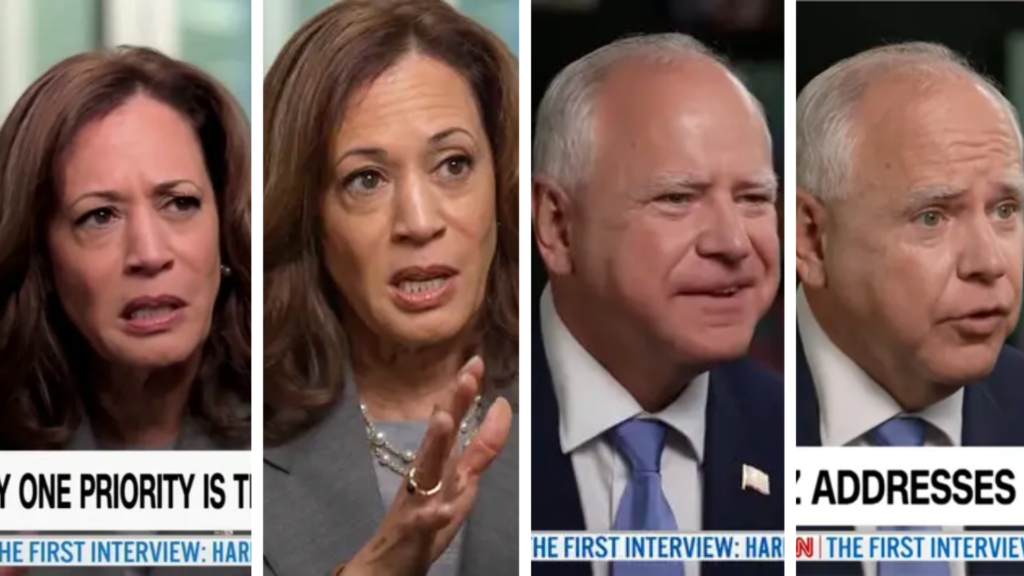
Vice President Kamala Harris and her running mate Tim Walz recently sat down for their first CNN interview together since becoming the Democratic nominee for president, speaking with CNN’s Dana Bash in Georgia just 68 days before the election. Covering a range of topics, Harris often focused on rhetoric rather than specifics.
On the issue of illegal immigration, a key topic for former President Donald Trump, Harris blamed him for the record-high levels of illegal border crossings during her administration since 2021.
Harris was joined by her running mate, Tim Walz, who answered almost as many questions as she did, taking up about half of the interview time.
Since taking office as Vice President in January 2021, Harris has faced scrutiny over her shifting positions on issues such as fracking, immigration, and economic policy. She insisted, however, that her “values have not changed.”
When asked by Bash what she would prioritize on her first day in the White House, Harris responded: “There are a number of things. First and foremost, one of my highest priorities is to support and strengthen the middle class. I believe Americans are ready for a new way forward, fueled by hope and optimism. Unfortunately, the former president pushed an agenda that diminished the strength of our nation, dividing us. I think people are ready to turn the page.”
When Bash pressed for more details on specific actions, Harris outlined her plans for what she calls an “opportunity economy.” She mentioned initiatives to reduce the cost of everyday goods, invest in small businesses, extend the child tax credit, and address affordable housing. “There are a number of things on day one,” she said.
Turning to Walz, Bash asked for his perspective. He expressed excitement about Harris’s agenda and spoke about his record as Minnesota’s governor. He was also questioned about a controversy involving a false claim of military service, which he attributed to “bad grammar.”
Bash then asked Harris about voters who might prefer the economic conditions under Trump, when groceries were cheaper and housing was more affordable. Harris responded by criticizing the previous administration’s handling of the COVID-19 pandemic and claiming her goal upon taking office was to “rescue America.” She highlighted that inflation is now under 3% and argued that her policies helped the U.S. recover faster than other wealthy nations, though these claims have been met with skepticism from economists across the political spectrum.
Bash also questioned why, after three and a half years as Vice President, Harris hadn’t already implemented many of the steps she was proposing. Harris cited progress on Medicare costs, prescription drugs, and job recovery but acknowledged more work needed to be done.
When asked if she still supported a ban on fracking, Harris firmly said, “No,” but did not clarify when or why she changed her stance. In 2019, she was a strong advocate for banning fracking. She did emphasize her commitment to climate change legislation, referencing her support for the Green New Deal and the Inflation Reduction Act.
On immigration, Bash pressed Harris about the record levels of illegal border crossings under the Biden-Harris administration. Harris, who was tasked with addressing the root causes of migration in 2021, defended her efforts, citing historic investments by American businesses in Central America and bipartisan work on immigration legislation. She accused Trump of blocking a border security bill that would have added 1,500 more agents and increased fentanyl seizures.
When reminded of her 2019 stance on decriminalizing border crossings, Harris said, “I believe there should be consequences,” emphasizing her experience as California’s Attorney General and her commitment to enforcing immigration laws.
Lastly, Harris was asked whether she would appoint a Republican to her cabinet. She confirmed that she would, though she did not have any specific names in mind. “I think it’s important to have people at the table with different views and experiences when making significant decisions,” she said.

